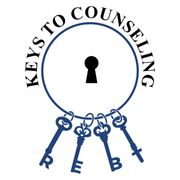Counseling Tampa: Simplify Your Anxiety Through Rational Emotive Behavior Therapy (REBT)

“There are three musts that hold us back: I must do well. You must treat me well. And the world must be easy.”
– Albert Ellis
At Keys to Counseling in Tampa, FL, I specialize in a specific type of therapy called Rational Emotive Behavior Therapy (REBT). Established by Dr. Albert Ellis in 1955, REBT is an active, directive, solution-focused, and goal-oriented approach to counseling and it is recognized as the pioneering form of Cognitive Behavioral Therapy (CBT).
In REBT, we believe that anxiety predominately falls under two categories: ego anxiety and discomfort anxiety. In other words, when examining all the various types of anxiety disorders that exist within the DSM (Diagnostic and Statistical Manual of Mental Disorders), for the purposes of therapy, we choose to narrow all of them down into these two groups which are derived from the broader REBT concepts of ego disturbance and discomfort disturbance. This means that ego disturbance and/or discomfort disturbance are always present when we hold irrational beliefs, and sometimes this results in anxiety (which we then categorize as ego anxiety or discomfort anxiety), and other times it results in other unhealthy emotions (i.e. depression, anger, guilt, shame, etc.)
Therefore, when we have anxiety, it is helpful to consider which type of anxiety is our go-to source of disturbance! Most likely, due to the fact that we (you, me, and all other people) are all fallible human beings biologically and culturally prone to irrational thinking from time-to-time, when we feel anxious, it is quite possible that we are simultaneously dealing with both types of anxiety. Even if you indeed recognize that your anxiety is derived from both ego disturbance and discomfort disturbance (i.e. you have both types of anxiety), it is generally helpful to focus on one at a time based upon choosing the type of anxiety that is most distressing for you.
In this article, I am going to review both ego disturbance and discomfort disturbance, as being able to identify the presence of both types of disturbance can help you to distinguish how your thought patterns differ depending on which type of anxiety you are experiencing in that moment. As a therapist, when my clients’ primary challenges pertain to anxiety, my first course of action is to help them figure out what core irrational beliefs are responsible for causing their anxiety. This helps us to decide which type of anxiety we will initially focus on, as well as and which irrational beliefs we will target, dispute, and replace first!
Remember, there is always a solution for successfully addressing our emotional and behavioral vulnerabilities, and that solution exists within ourselves, our way of thinking, and our willingness to transform our rigid, habitual, and learned irrational beliefs into flexible, open-minded, and rational alternatives! Of course, we are all a work-in-progress, and we will all have our good and bad moments (hours, days, weeks, months, and even years) in life, where we struggle more than others. That being said, I truly believe that REBT, when properly integrated into our lives, helps to substantially reduce the frequency and intensity of those tough moments, because it teaches us to more effectively deal with our challenges, our defeats, and our most challenging days in a realistic, logical, and efficient manner!
To better understand the origin of our anxiety, as well as the concepts of ego disturbance and discomfort disturbance, it will be helpful to remember these two overarching REBT ideas:
The first REBT concept I will discuss pertains to the five irrational beliefs that cause us emotional and behavioral distress and disturbance:
· Demandingness
· Awfulzing/Catastrophizing
· Frustration Intolerance
· Global Ratings/Evaluations of Self-Worth
· Global Ratings/Evaluations of Others’-Worth and Life-Worth)
1. It is not specific adversities or events that emotionally disturb us, but our rigid and extreme attitudes about the challenges within our lives that disturb us. In other words, we upset ourselves by how we think about our adversities (large and small).
Through our stubborn, learned, habitual irrational thinking, we cause ourselves fear, anxiety, depression, and anger by demanding that particular outcomes absolutely must, should, ought, have to, and need to occur, as well as believing that when unfortunate circumstances arise they are awful, catastrophic, and unbearable, meaning we could not withstand tolerating our frustration and discomfort regarding such challenges.
We also potentially disturb ourselves by irrationally and globally rating ourselves, others, or life in general with black and white labels (such as good, bad, lazy, motivated, etc.), as opposed to rationally and simply rating behaviors, and not an entire person or life experience.
The second REBT concept I want to cover pertains to the significance of ego disturbance and discomfort disturbance:
2. Once we are familiar with the five irrational beliefs, it is helpful to understand that there are two primary ways that we disturb ourselves through our irrational thinking, and that comes down to:
Ego Disturbance: Things need to go as I desire them to. I ought to do well, you have to treat me well, and life in general should be easy and comfortable. In my mind, when the things that I believe must happen do not actually happen, it negatively impacts my view of myself. I start to see myself as inadequate, less than others, and worthless.
Discomfort Disturbance: Things need to go as I desire them to. I ought to do well, you have to treat me well, and life in general should be easy and comfortable. In my mind, when I do not do well or I am not treated well, I become highly uncomfortable and/or frustrated, and I believe that I cannot withstand such discomfort and frustration, as I think I must be comfortable all the time.
In both of the above examples of ego disturbance and discomfort disturbance, all five irrational beliefs are present. Through REBT, we advocate for learning how to cultivate rational coping statements, which ultimately helps us to replace our irrational ways of thinking with rational new beliefs that effectively alleviate both ego and discomfort disturbances by transforming our unhealthy emotions ( such as anxiety or anger) and unhelpful behaviors (such as avoidance or yelling) into healthier and more adaptive alternatives! Below are examples of rational coping statements for both ego disturbance and discomfort disturbance:
Rational Coping Statements for Ego Disturbance:
I want things to go well for me and I want others to treat me well, but these idealistic conditions do not have to happen. When life is difficult, and people treat me poorly, that does not in any way diminish my individual value or worth as a human being.
Even if I have made mistakes that have potentially contributed to my challenges, this is simply evidence that I am human with the inevitable capacity to behave well as times and behave poorly in other times, but my entire self-worth cannot be globally rated, based solely upon good and/or bad behavior. I may rate my behavior, but not my worth as a person.
I will aspire to learn from each experience, with the overarching goal of living to ENJOY my life, rather than living to prove myself or prove my value as a human being. Just because I behave or perform badly, does not mean that I am a bad person. Just because I experience anxiety, depression, or anger at times, does not mean I have to label myself as an entirely anxious, depressed, or angry person.
Rational Coping Statement for Discomfort Disturbance:
I want life circumstances and events to go well for me and I want others to treat me well, but perfect or ideal conditions do not have to happen. When life is difficult, and people treat me poorly, it is unfortunate, less than ideal, and disappointing, and I may experience uncomfortable feelings and/or even physical discomfort, but these feelings and these experiences are bearable – I can tolerate my frustration and discomfort, as well as the inconvenience of other people’s behaviors, unfortunate life circumstances, and events, even though I will never actually enjoy it.
I can still accept that which I prefer not to have happen, and therefore do not like! My preferences are not demands and I can withstand the frustration and discomfort of not having my desires met!
By doing this, I am choosing to hold an attitude that empowers me, because I am not allowing that which I cannot control (other people, the world in general, etc.) to control me; rather, I am making a decision to accept that which I cannot change, and focus on improving all that is within my power to transform, such as my perspective and my reaction to frustrating circumstances.
Final Thoughts
Next time you feel yourself becoming emotionally activated (i.e. you start to experience unhealthy negative emotions), begin looking for the presence of both ego disturbance and/or discomfort disturbance. In other words, when you begin to feel unhealthy negative emotions (such anxiety, depression, anger, guilt, jealousy, envy, etc.) observe what the potential activating event might be for you (this is the circumstance or adversity that occurs prior to you feeling anxious, angry, etc.), and then examine how you are behaving, as well as what you are thinking in those moments.
Can you figure out what irrational beliefs you may be thinking, and furthermore, can you decipher whether they are associated with ego disturbance or discomfort disturbance? Don’t expect this to be easy; rather, try to have fun with it and use it as a strategy to alleviate your anxiety, as well as any other forms of emotional and behavioral distress as soon as you begin to experience it.
Through REBT, I give both individuals and couples countless psycho-educational cognitive, emotive, behavioral, and communicative tools, combined with coping strategies and therapeutic techniques that help them to effectively manage and relieve their anxiety, depression, anger, and other unhealthy negative emotions that occur both inside and outside of the counseling session. By teaching them about REBT and the specific models that I utilize as a REBT-CBT-based counselor, I help to empower my clients through teaching them to become their own best source of support in the long-term! By reinforcing the ideas discussed within this article and integrating them into your own cognitive processes, you will be amazed at how quickly you can become your own best therapist, thereby truly transforming the way you think, feel, behave, and live!
At Keys to Counseling in Tampa, Florida, my mission is to promote healthy living through rational thinking! I provide both individual and couples counseling, and I would be honored to cognitively, emotively, and behaviorally accompany you on your journey to living, loving, being, and staying better!
Written by Jaclyn Hall, Founder of Keys to Counseling in Tampa, FL
If you are ready to take a positive and empowering step into your future, reach out to Jaclyn Hall at Keys to Counseling for a truly life-changing approach to individual and couples counseling. Call her office today at (813) 397-8099 for a free phone consultation!
About the Business
Have a question? Ask the experts!
Send your question

